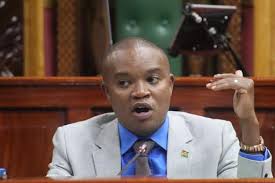
THE National Assembly Finance and Planning Committee has tabled its report on the Virtual Assets Service Providers Bill 2025, in the latest of Kenya’s efforts to tighten its financial laws to tame illicit financial flows.
This comes barely a week after President William Ruto signed into law the Anti-Money Laundering and Combating of Terrorism Financing Laws (Amendment) Bill 2025, as Kenya seeks to be dropped from the money laundering grey list.
The new law has tightened the noose on financial activities in the real estate sector, gambling, Saccos and pension funds, as part of reforms to curb money laundering and financing of terrorism activities.
The country is also keen to improve supervision of Virtual Assets Service Providers (VASPs).
The Committee has proposed the deletion of the clause which grants the regulatory authority the mandate to conduct offsite surveillance of a Virtual Assets Service Provider's (VASPs) infrastructure, a sigh of relief for industry players.
“The stakeholder observed that this provision is overly prescriptive with no clear definition or boundaries on what off site surveillance entails,” the committee, chaired by Molo MP Kimani Kuria, says in its report.
It proposes the widening of the eligibility of Virtual Asset Service Providers to include Limited liability partnerships (LLPs).
LLPs allow for a partnership structure where each partner's liabilities are limited to the amount they put into the business.
Having business partners means spreading risk, leveraging individual skills and expertise, and establishing a division of labour. Currently, the Bill limits this to companies (VASPs) registered under the Companies Act.
VASPs are entities that provide services related to virtual assets. These services include, but are not limited to, exchanging virtual assets for fiat currency or other virtual assets, transferring virtual assets and safekeeping or administration of virtual assets or instruments that control them.
A
virtual asset is a digital representation of value that can be digitally
traded, or transferred and can be used for payment or investment purposes,
which the Bill seeks to control.
The Virtual Asset Service Providers Bill, 2025 also aims to regulate VASPs and address risks associated with their operations.
Digital assets include cryptocurrencies like Bitcoin and Ether, as well as other digital tokens like NFTs ( non-fungible tokens) and stablecoins.
Every virtual asset service provider shall at all times open and operate a bank account in Kenya.
“This Bill will form strong emphasis on the prevenstion and management of common interest among the licensed virtual asset providers. Under this Bill VASPs are required to establish and maintain effective internal policies and procedures designed to indentify, mitigate and manage actual conflict of interest that may arise and report to the authorities,” Kuria said during the report presentation in Parliament.
On licensing, sector stakeholders had proposed an amendment to provide for a timeline within which the regulatory authority shall give feedback to an applicant for a virtual asset service provider license. The stakeholder proposed a period of 90 days.
They also want the validity period of a license be 12 months from the time it is issued as opposed to the renewal of every December 31, of the year it is issued, which they say may create unnecessary administrative burdens for both the regulator and the VASPS.
MPs have repealed the digital assets tax set at three per cent of transaction amounts, in favour of a new excise duty on transaction fees, signaling lower cost for users of cryptocurrencies and other virtual assets.
The Finance Bill, 2025 initially proposed to halve the digital assets tax to 1.5 per cent, but subsequent amendments went further, removing the tax altogether.
Instead, lawmakers proposed an alternative, a 10 per cent excise duty on transaction fees within the digital assets ecosystem.
This change is expected to significantly lower the costs associated with cryptocurrency transactions, encouraging broader adoption across the country.
Kenya has witnessed a rise in cryptocurrency adoption with over 10 milllion citizens now holding one form of a digital asset or another, according to
Several strategies are commonly used for laundering money with cryptocurrency used by criminals to buy and sell illicit goods on anonymous online marketplaces.
There is also fake initial coin offerings where fraudulent ICOs can serve as a front to launder illicit funds.
According to Bowmans, a law firm that specializes in Kenyan laws, the Bill represents a watershed moment for virtual assets in Kenya.
“While it offers legitimacy and investor confidence, it also places significant obligations on VASPs. Companies looking to scale responsibly in this space should start adapting their operations to meet the forthcoming regulatory expectations,” it said.
The Updated Bill amends the Proceeds of Crime and Anti-Money Laundering Act (Cap 59A) by including VASPs as reporting institutions and excludes the proliferation of financing from the anti-money laundering and counterterrorism provisions.





![[PHOTOS]: Ruto meets security chiefs at State House, Nairobi](/_next/image?url=https%3A%2F%2Fcdn.radioafrica.digital%2Fimage%2F2025%2F06%2Fc4c42fa7-00eb-43a9-81a8-aff44a446021.jpg&w=3840&q=100)



